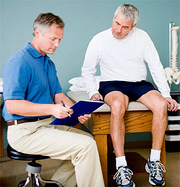Dealing With Back Pain Head-On
By Dr. Louis Sportelli
Patients often walk into my office for the first time and complain about their severe back pain with comments like, "Even moving my eyes hurts!" At this stage, most first-time back pain sufferers are willing to do almost anything to relieve their pain.
Those few fortunate individuals who don't suffer from back pain can't fully appreciate the kind of personal anguish, suffering and debilitation this universal problem can cause. It can incapacitate an individual, relegating them to the status of an invalid.
I hear essentially the same questions, regardless of the patient: How can the vertebrae cause so much pain? What can I do immediately to get rid of the pain and discomfort? Do medications work and are they harmful? Will therapy or chiropractic help me? Is surgery the only option? How can I know what I should try?
The thought of surgery is frightening to most people, and for good reason. Surgical procedures, particularly back/spine surgeries, carry with them the possibility of permanent disability or life in pain. More and more people faced with the option of surgery are discovering that consulting a doctor of chiropractic is their best bet because chiropractors study the spine, treat conservatively and refer to other specialists if needed.
What Causes Back Pain?
 Pain often is the result of inflammation caused by strain, sprain or some other structural imbalance to the spine. Injury to the disc (that jelly-like cushion between the vertebrae) also can cause discomfort. Weak muscles, poor posture, excessive strain, and wear-and-tear generally associated with aging all can play a roll in causing back pain.
Pain often is the result of inflammation caused by strain, sprain or some other structural imbalance to the spine. Injury to the disc (that jelly-like cushion between the vertebrae) also can cause discomfort. Weak muscles, poor posture, excessive strain, and wear-and-tear generally associated with aging all can play a roll in causing back pain.
It's the "quality of life" issues that really make back pain so personally challenging for millions of individuals afflicted every day. Simple movements - such as brushing your teeth, bending over, sitting in a chair or even going to the bathroom - make back pain a problem that must be dealt with. Otherwise, even the simplest of activities can be agonizingly difficult. There is no broken bone, no cut, no bandage, no outward visible signs others can see, which makes it hard for those afflicted with severe back pain to convince others the problem is real. This often leads to psychological distress and even depression.
What Are Your Options?
Here's what not to do if you're suffering from back pain:
Do nothing. Many people have a fear of the pain or a fear of what they might have to endure to get rid of the pain and so they do nothing. That is not an option simply because no one can live with an inability to perform even limited activities of daily living.
Take medication. Others might seek to mask the pain with over-the-counter medication such as aspirin, naproxen or ibuprofen. Even these easy-to-obtain medications carry with them potential complications such as gastrointestinal bleeding, abnormal kidney function and many other possible side effects. If aspirin, the most common and widely used drug, can cause reactions, it's not surprising that other painkillers such as codeine, oxycodone or morphine can cause even more complications.
One thing often overlooked is the fact that there are no "safe" medications. Each and every one carries with it a list of side effects, symptoms and potential problems, and when taken in combination, it's an almost impossible task to predict how each individual will react or respond.
There isn't a strong enough case for judicious use of pain medications, whether prescribed or purchased over the counter. Recent news reports tell us our drinking water is filled with trace amounts of approximately 60 to 80 different medications. There is simply no way to tell how these will react within the body over time. There may be a special time and place for drugs, but they should be reserved for the gravest of circumstances and each medication taken with great care.

